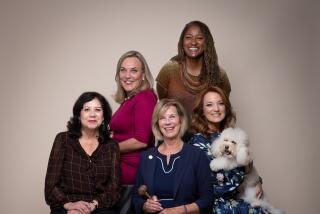Alexander H. Pope dies at 80; former Los Angeles County assessor
Alexander H. Pope, who was a Westwood attorney when he became the Los Angeles County assessor in 1978 and soon faced the challenge of implementing property tax rollbacks newly mandated by Proposition 13, has died. He was 80.
Pope, who later became executive director of the California Citizens Budget Commission, died Tuesday of complications of Parkinson’s disease at his home in Berkeley, said his wife, Kate.
After becoming a partner in the Fine & Pope law firm in 1957, Pope served as legislative secretary for Gov. Pat Brown from 1959 to 1961, during which he supervised a staff of 20 in lobbying for administration programs with the state Legislature.
Known as a longtime activist in Democratic Party matters, he was appointed to the California Highway Commission in 1966 and served until 1970. In 1973, he was named to the Los Angeles Board of Airport Commissioners.
Then, in January 1978, Pope was appointed Los Angeles County assessor by the Board of Supervisors to fill out the unexpired term of Assessor Philip Watson, who had received a disability retirement.
Pope had only a few months on the job before Proposition 13, the landmark property tax relief initiative, was passed that June, placing him on what a Times writer described as “the firing line.”
Pope, according to the 1978 Times article, had openly opposed the measure, “although ironically he gave the initiative a big boost in May when he released -- and then canceled -- the 1978 assessment roll with its galloping market values.”
The June election returns, The Times reported, placed Pope in “uncharted waters to implement Proposition 13, and to stand for election, himself, in November [for a runoff] on the basis of his record.”
Pope won the 1978 election as assessor and was reelected in 1982.
“Alex was the right person in that office,” said Mark Ryavec, who served as special assistant and then chief deputy assessor during Pope’s second term.
“With his legal training and his time in government in Sacramento, it made him the perfect person to take on this change.
“And he was instrumental not just in the county but in the state in writing the new rules that implemented Prop. 13.”
Paul Hannah, who served for a time as assistant assessor under Pope, recalled that “after Prop. 13, there was a great deal of uncertainty and confusion about implementing certain portions of it.
“Alex was the most influential voice in guiding the Legislature, the California Assessors’ Assn. and the State Board of Equalization in interpreting Prop. 13 in its many facets.”
Pope, according to Ryavec, also was the first assessor in the state to reduce property tax assessments on a systematic basis when condominium values declined across the county in the early ‘80s.
“Instead of waiting for taxpayers to come forward and submit an application to have their assessed value reduced, he ordered staff to do a countywide review of all condominium prices, and in the end, reduced taxes on about 10,000 condominiums,” Ryavec said.
Ryavec said Pope -- who as assessor once joined then-Los Angeles City Councilman Bob Ronka in visiting San Fernando Valley neighborhoods hit by floods and mudslides to talk to homeowners and explain how the damage to their homes entitled them to apply for property tax relief -- was “a marvelous mentor.”
“He was a gentle soul and always on the go, always engaged with projects and activities to improve the office,” he said. “When he was not doing that, he was hiking and traveling. He really lived a carpe diem -- seize the day -- life at all turns.”
After his years as assessor, Pope returned to practicing law in 1987 and became a member of the state and local tax committees of both the State Bar of California and the Los Angeles County Bar Assn.
He also served for several years as a member of the California Citizens Budget Commission before becoming its executive director in 1997.
Under his leadership as executive director, the commission issued its recommendations for reforming the state’s budget process in a 1998 report titled “A 21st Century Budget Process for California.”
Pope retired in 2000.
He was born June 4, 1929, in New York City and reared in New Jersey and Chicago.
A Phi Beta Kappa graduate of the University of Chicago and its law school, where he was managing editor of the Law Review, Pope served in the Army from 1952 to 1954. That included a stint in Korea as the news analyst for the 8th Army in Seoul.
In addition to Kate, his wife of 23 years, he is survived by his children from his first marriage, Daniel, Stephen and Virginia; two brothers, Hallowell and Whitney; and two grandchildren.
A memorial gathering is pending.
Donations in Pope’s name may be made to the American Civil Liberties Foundation, the Nature Conservancy and the Sierra Club Foundation.
More to Read
Start your day right
Sign up for Essential California for the L.A. Times biggest news, features and recommendations in your inbox six days a week.
You may occasionally receive promotional content from the Los Angeles Times.







